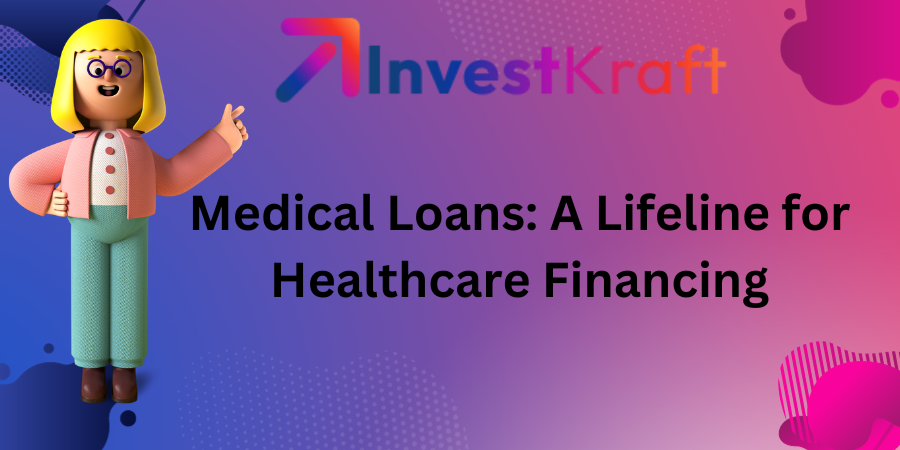In today’s world, healthcare expenses can be a significant financial burden. Unexpected medical bills or planned procedures often come with costs that strain our budgets. In such situations, having access to financial assistance can be a lifeline, and this is where medical loans step in to provide much-needed relief.
Understanding Medical Loans:
Medical loans are a specialized financial product tailored to cover healthcare-related expenses. They fill a unique niche in the lending industry by addressing the specific needs of individuals facing medical procedures, treatments, surgeries, or healthcare-related costs. Here’s a deeper understanding of medical loans:
1. Targeted Healthcare Financing:
Medical loans are explicitly designed to cater to healthcare expenses, making them distinct from generic personal loans or credit cards. They acknowledge that medical costs often come at unexpected times and can be substantial. These loans bridge the financial gap between what individuals can afford and the cost of necessary medical care.
2. A Financial Lifeline for Medical Needs:
In times of illness, injury, or medical emergencies, individuals may find themselves in need of significant funds for treatments and procedures. Medical loans serve as a crucial financial lifeline, ensuring that people can access the healthcare they require promptly. This access can be especially vital when insurance coverage falls short or when elective medical procedures are not covered.
3. Comprehensive Coverage:
One of the key advantages of medical loans is their versatility. They can be used to cover a wide range of healthcare costs, including but not limited to:
- Hospital Stays: Whether it’s an emergency hospitalization or a planned surgical procedure, medical loans can cover the costs of hospital stays, including room charges, medical tests, and nursing care.
- Surgery Fees: Many medical treatments involve surgical procedures, which can be expensive. Medical loans help individuals afford surgical expenses, ensuring that they receive the necessary care without delay.
- Doctor Consultations: Routine check-ups, specialist consultations, and diagnostic tests often incur fees. Medical loans can be used to cover these expenses, promoting regular healthcare maintenance.
- Prescription Medications: The cost of prescription drugs can add up, especially for individuals with chronic conditions. Medical loans provide the funds needed to purchase essential medications.
- Medical Equipment: Some medical conditions require specialized equipment or devices, such as mobility aids, ventilators, or home healthcare apparatus. Medical loans can finance the purchase or rental of these items.
4. Timely Access to Care:
Medical loans are known for their quick approval processes, which can be crucial in healthcare situations. Medical needs often come with a sense of urgency, and delays in accessing care can have adverse consequences. With medical loans, individuals can swiftly secure the funds required to initiate treatment, reducing the stress associated with healthcare financing.
5. Personalized Repayment Plans:
To accommodate the diverse financial situations of borrowers, medical loans offer personalized repayment options. Borrowers can select from various repayment terms, allowing them to tailor the loan to their budget. This flexibility ensures that individuals can comfortably manage their loan payments while focusing on their health.
6. Avoiding Financial Strain:
Medical loans help individuals avoid financial strain during challenging times. They prevent the need to deplete savings or emergency funds, preserving financial security for other essential needs and unexpected emergencies. This financial cushion can be especially reassuring when facing medical uncertainty.
Why Choose Medical Loans?
- Quick Access to Funds: Medical emergencies often require immediate attention. Medical loans are known for their quick approval process, making them ideal for situations where time is of the essence. Unlike some other forms of financing, you can often receive the funds within a short period after approval.
- Flexible Repayment Options: Medical loans provide borrowers with the flexibility to tailor their repayment terms to their financial situation. Whether you need a short-term loan to cover an unexpected medical expense or a longer-term loan for more extensive treatments, you can choose a repayment plan that aligns with your budget. This flexibility reduces the financial strain and allows borrowers to comfortably manage their debt.
- No Collateral Required: Unlike secured loans, such as home equity loans or auto loans, medical loans are typically unsecured. This means you don’t need to pledge any collateral, like your home or car, to secure the loan. Unsecured loans lessen the risk for borrowers, as they don’t risk losing valuable assets if they face difficulties with repayment.
- Maintain Your Savings: Medical loans can help individuals preserve their savings or emergency funds. When faced with unexpected medical expenses, it’s often tempting to dip into savings. However, a medical loan allows you to keep your financial safety net intact. By spreading the cost over manageable monthly payments, you can address your healthcare needs while safeguarding your savings for other financial priorities or emergencies.
Applying for a Medical Loan:
- Assess Your Needs: Start by evaluating your healthcare expenses. Determine the precise amount you need to borrow to cover your medical bills, treatments, or procedures. This ensures you borrow an amount that matches your requirements, preventing unnecessary debt.
- Research Lenders: Explore a variety of lenders offering medical loans, including traditional banks, credit unions, online lenders, and specialized healthcare financing companies. Pay close attention to interest rates, loan terms, and any associated fees. Comparing lenders allows you to choose the most favorable terms for your situation.
- Check Eligibility: Each lender may have specific eligibility criteria, such as minimum credit score requirements or income thresholds. Review these criteria to ensure you meet them before applying. This minimizes the likelihood of rejection and potential negative impacts on your credit score.
- Gather Documentation: Lenders typically require specific documentation during the application process. Common documents include proof of identity, proof of income, and medical bills or estimates. Collect these documents in advance to expedite the application process.
- Apply Online or In-Person: Depending on the lender’s offerings and your preferences, you can complete the loan application online through the lender’s website or in-person by visiting a local branch. Online applications are convenient and can often be processed more swiftly.
- Loan Approval: After submitting your application, the lender will review your financial information and credit history to make a lending decision. If approved, you will receive notification, along with the terms and conditions of the loan.
- Use Funds Wisely: Once you have access to the funds, it’s essential to use them exclusively for medical expenses. This ensures that the loan serves its intended purpose and maximizes the benefits of the loan.
The Importance of Responsible Borrowing:
- Borrow Only What You Need: While medical loans offer financial assistance, it’s crucial to borrow only the amount required to cover your medical expenses. Borrowing more than necessary can lead to higher debt levels and increased interest costs.
- Understand the Terms: Thoroughly read and comprehend the loan terms and conditions, including interest rates, fees, and repayment schedules. This knowledge empowers you to make informed decisions and avoid any unexpected surprises during the repayment process.
- Plan for Repayment: Develop a repayment plan that aligns with your financial situation. Ensure you can comfortably manage the monthly loan payments within your budget. A well-thought-out repayment plan helps prevent missed payments and potential financial stress.
- Compare Lenders: Before committing to a medical loan, compare offers from multiple lenders. By shopping around for the best loan terms and interest rates, you can minimize the overall cost of borrowing and potentially secure more favorable terms.
In conclusion, medical loans serve as a valuable financial resource for individuals facing unexpected medical expenses. Their accessibility, flexibility, and quick approval process make them a lifeline in times of healthcare crises. However, responsible borrowing practices are essential to ensure that medical loans remain a helpful tool rather than a financial burden. By understanding the advantages of medical loans and following responsible borrowing guidelines, individuals can access the necessary healthcare while safeguarding their financial well-being.




